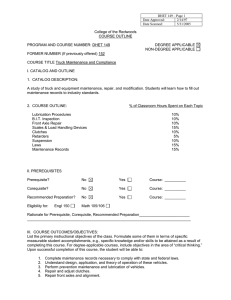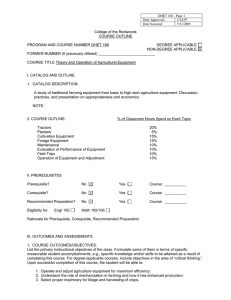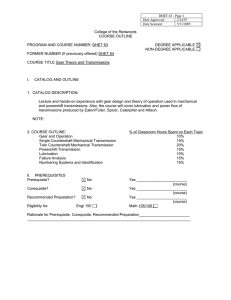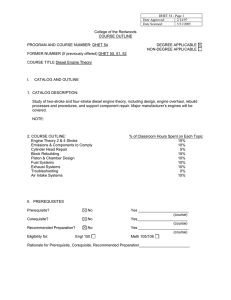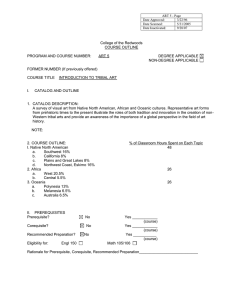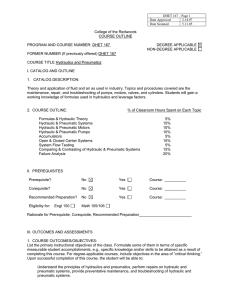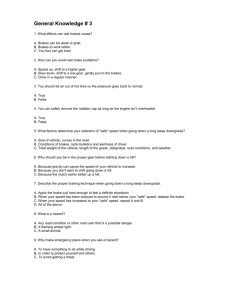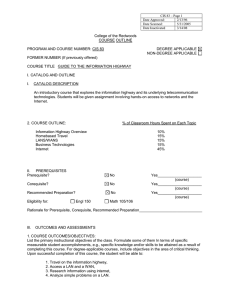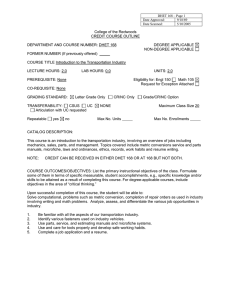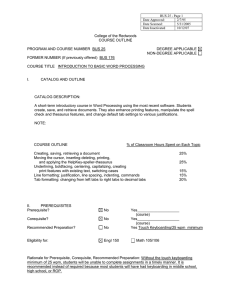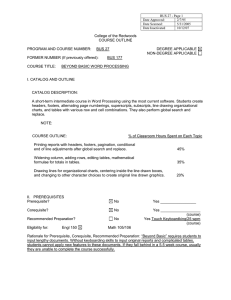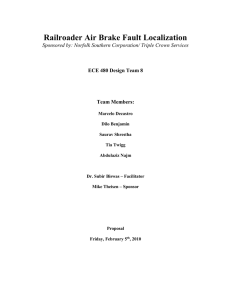College of the Redwoods COURSE OUTLINE
advertisement
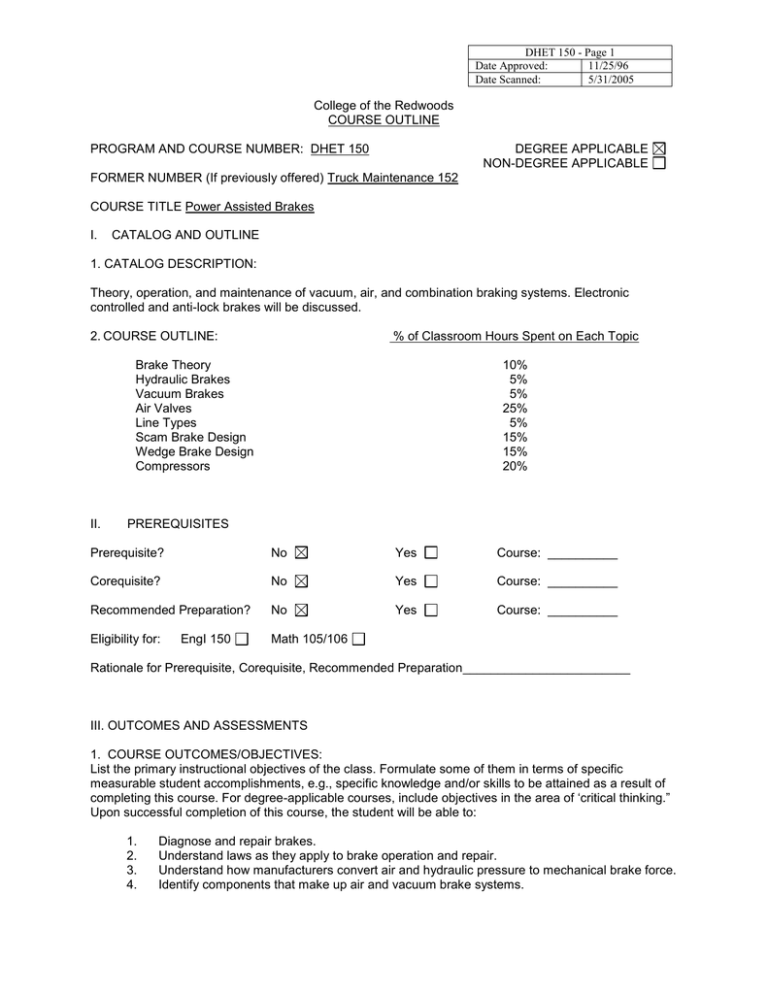
DHET 150 - Page 1 Date Approved: 11/25/96 Date Scanned: 5/31/2005 College of the Redwoods COURSE OUTLINE PROGRAM AND COURSE NUMBER: DHET 150 DEGREE APPLICABLE NON-DEGREE APPLICABLE FORMER NUMBER (If previously offered) Truck Maintenance 152 COURSE TITLE Power Assisted Brakes I. CATALOG AND OUTLINE 1. CATALOG DESCRIPTION: Theory, operation, and maintenance of vacuum, air, and combination braking systems. Electronic controlled and anti-lock brakes will be discussed. 2. COURSE OUTLINE: % of Classroom Hours Spent on Each Topic Brake Theory Hydraulic Brakes Vacuum Brakes Air Valves Line Types Scam Brake Design Wedge Brake Design Compressors II. 10% 5% 5% 25% 5% 15% 15% 20% PREREQUISITES Prerequisite? No Yes Course: __________ Corequisite? No Yes Course: __________ Recommended Preparation? No Yes Course: __________ Eligibility for: Math 105/106 EngI 150 Rationale for Prerequisite, Corequisite, Recommended Preparation________________________ III. OUTCOMES AND ASSESSMENTS 1. COURSE OUTCOMES/OBJECTIVES: List the primary instructional objectives of the class. Formulate some of them in terms of specific measurable student accomplishments, e.g., specific knowledge and/or skills to be attained as a result of completing this course. For degree-applicable courses, include objectives in the area of ‘critical thinking.” Upon successful completion of this course, the student will be able to: 1. 2. 3. 4. Diagnose and repair brakes. Understand laws as they apply to brake operation and repair. Understand how manufacturers convert air and hydraulic pressure to mechanical brake force. Identify components that make up air and vacuum brake systems. DHET 150 - Page 2 Date Approved: 11/25/96 Date Scanned: 5/31/2005 2. COLLEGE LEVEL CRITICAL THINKING TASKS/ASSIGNMENTS: Degree applicable courses must include critical thinking tasks/assignments. This section need not be completed for non-credit courses. Describe how the course requires students to independently analyze, synthesize, explain, assess, anticipate and/or define problems, formulate and assess solutions, apply principles to new situations, etc. Students determine applied pressures to brakes using mathematical calculations of chamber sizes, air pressure, and fulcrum levers. Students anticipate problems with systems using gauges, isolation of components, and testing 3. ASSESSMENT Degree applicable courses must have a minimum of one response in category 1, 2, or 3. If category 1 is not checked, the department must explain why substantial writing assignments are an inappropriate basis for at least part of the grade. 1. Substantial writing assignments, including: essay exam(s) term or other paper(s) written homework reading report(s) laboratory report(s) other (specify) _____ If the course is degree applicable, substantial writing assignments in this course are inappropriate because: The course is primarily computational in nature. The course primarily involves skill demonstrations or problem solving. Other rationale (explain) __________________________________________ 2. Computational or Non-computational problem-solving demonstrations, including: exam(s) quizzes homework problems laboratory report(s) field work other (specify)_______ 3. Skill demonstrations, including: class performance(s) other (specify)____ 4. Objective examinations, including: multiple choice completion field work performance exam(s) true/false other (specify) matching items 5. Other (specify) ____________________________________ NOTE: A course grade may not be based solely on attendance. DHET 150 - Page 3 Date Approved: 11/25/96 Date Scanned: 5/31/2005 APPROPRIATE TEXTS AND MATERIALS: (Indicate textbooks that may be required or recommended, including alternate texts that may be used.) Text(s) Title: Heavy Duty Truck Systems Required Edition: 2nd Alternate Author: Ian Andrew Norman/Robert Schuaff/John A. Corinchock Recommended Publisher: Delmar Date Published: 1996 (Additional required, alternate, or recommended texts should be listed on a separate sheet and attached.) For degree applicable courses the adopted texts have been certified to be college-level: Yes. Basis for determination: is used by two or more four-year colleges or universities (certified by the Division Chair or Branch Coordinator, or Center Dean) OR has been certified by the LAC as being of college level using the Coleman and Dale-Chall Readability Index Scale. No. Request for Exception Attached REQUIRED READING, WRITING, AND OTHER OUTSIDE OF CLASS ASSIGNMENTS: Over an 18-week presentation of the course, 3 hours per week are required for each unit of credit. ALL Degree Applicable Credit classes must treat subject matter with a scope and intensity which require the student to study outside of class. Two hours of independent work done out of class are required for each hour of lecture. Lab and activity classes must also require some outside of class work. Outside of the regular class time the students in this class will be doing the following: Study Answer questions Skill practice Required reading Problem solving activity or exercise Written work (essays/compositions/report/analysis/research) Journal (reaction and evaluation of class, done on a continuing basis throughout the semester) Observation of or participation in an activity related to course content (e.g., play, museum, concert, debate, meeting, etc.) Field trips Other (specify) ____________________________ DHET 150 - Page 4 Date Approved: 11/25/96 Date Scanned: 5/31/2005 V. TECHNICAL INFORMATION 1. Contact Hours Per Week: (Indicate 5. Recommended Maximum Class Size 24 (work stations) "TOTAL" hours if less than semester length) Lecture: 2 Lab: Weekly 3 TOTAL Weekly No. of Weeks S TOTAL (S = semester length) 6. Transferability CSU UC List two UC/CSU campuses with similar courses (include course #s) (Use Request for Exception sheet to justify CSU Chico, AGET 081, Agricultural Power more-than-minimum required hours.) Hydraulics Units 3.0 or Articulation with UC requested Variable Unit Range 7. Grading Standard 2. TLUs 6.0 Letter Grade Only CR/NC Only 3. Does course fulfill a General Education requirement? (For existing courses only; for new courses, use GE Application Form) Grade-CR/NC Option Grade-CR/NC Option Criteria: Introductory 1st course in sequence Yes No If yes, in what G.E. area? AA/AS Area Exploratory 8. Is course repeatable Yes No If so, repeatable to a maximum of: CSU/GE Area Total Enrollments IGETC Area Total Units (Use Request for Exception sheet to justify repeatability.) 4. Method of Instruction: Lecture Lab Lecture/Lab Independent Study 9. SAM Classification C Course Classification I
